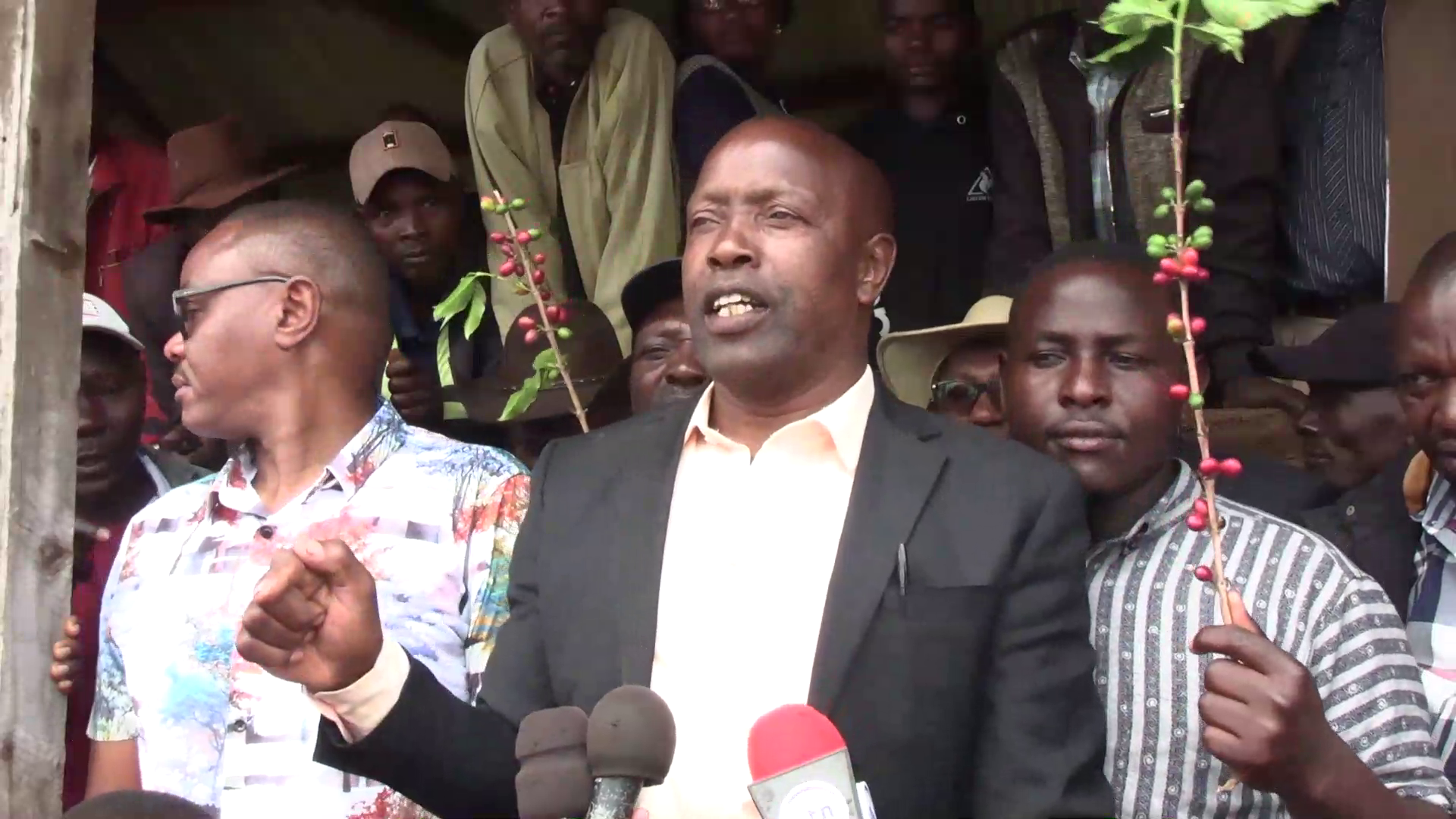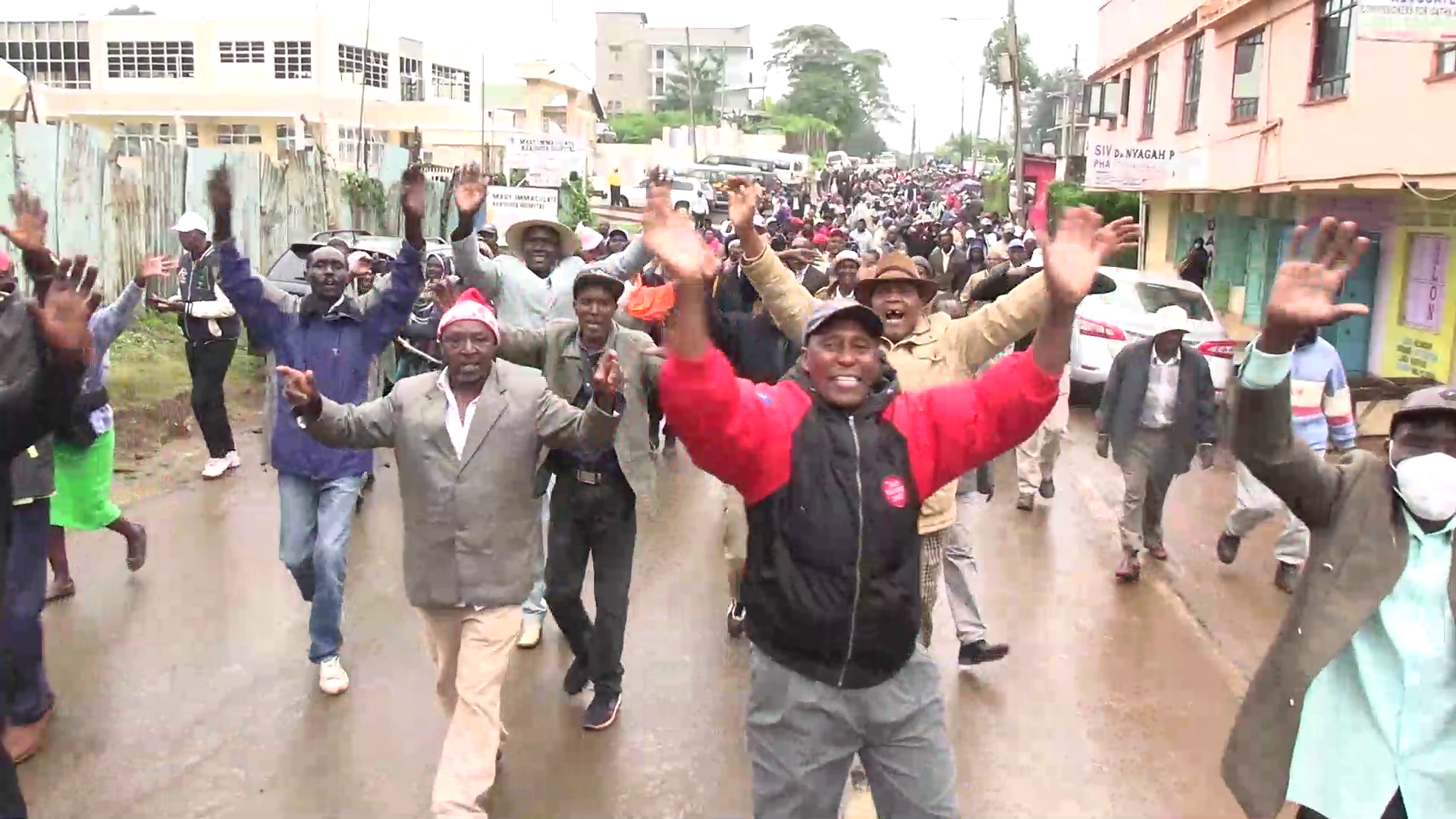
 Coffee farmer David Kimani addressing farmers in Kerugoya town, Kirinyaga county on September 1, 2025
Coffee farmer David Kimani addressing farmers in Kerugoya town, Kirinyaga county on September 1, 2025The National Coffee Cooperative Union (NACCU) has threatened to stop selling its produce through the National Coffee Exchange following sustained disagreements with the government.
The union has insisted that it will not follow a directive issued by Co-operatives Cabinet Secretary Wycliffe Oparanya to have coffee farmers paid through their mobile phones through the Direct Settlement System (DSS).
The system was put in place in 2023 to ensure coffee buyers pay farmers within seven days of buying coffee and is operated through the Co-operative Bank.
At first, the DSS paid coffee farmers through their co-operative societies that then deducted their management fees before forwarding the rest of the money to farmers.
In November last year, however, Oparanya issued a directive requiring all co-operatives to hand-over farmers’ data before June this year with the intention of paying farmers directly and by-passing the co-operatives, a decision that has elicited strong reactions from farmers.
NACCU secretary general Bahama Muriithi said the state is being deceived by technocrats with little knowledge on how the sector operates and how small-holder farmers sustain themselves.
He dismissed earlier claims by Oparanya that some co-operatives’ managers were stealing from farmers and enriching themselves while the growers languish in poverty.
“If you say people are stealing from farmers, aren’t there courts where people found culpable can be taken and charged? If you don’t listen to us, we will leave National Coffee Exchange and establish our own markets and we’re ready to do so,” he said.
Muriithi vowed to ensure farmers’ interests are safeguarded saying the crop supports over 800,000 smallholder coffee farmers in 33 coffee growing counties, primarily in Central, Western, Rift Valley and Nyanza regions.
Felix Mwai, NACCU’s chairperson, explained that coffee stays in farms for about six months before being harvested after which they are processed in local factories that are operated by co-operatives for about two months before being transported to millers.
“This means that a farmer has to wait for over one year to receive his proceeds. A kilogramme of coffee cherry costs the farmer about Sh30 to produce and without the proceeds, he depends on his co-operative to tend to his farm and support his family,” he said.
Mwai challenged the government to take stern action against rogue coffee co-operative heads who loot farmers’ money instead of destroying the co-operative movement that he said is the backbone of the coffee sector.
 Coffee farmers protest on the streets of Kerugoya town in Kirinyaga county on September 1, 2025.
Coffee farmers protest on the streets of Kerugoya town in Kirinyaga county on September 1, 2025.Disrupting the co-operatives, he said, would cause significant disturbance in the sector and potentially lead to the collapse of coffee farming that supports the economy through exports.
This year, Mwai said the sector has already raked in Sh49 billion from exports and is a top foreign exchange earner for the country.
“Any action that jeopardises co-operatives jeopardises over 70 per cent of the sector that is controlled by them. We have over 1,000 coffee co-operatives. If 99 per cent of them are good, why not deal with the one per cent that is not working well?” he asked.
David Kimani, a farmer, pleaded with President William Ruto to intervene and help resolve the conflicts between them and the Co-operatives ministry. Coffee belongs to farmers and they should be consulted when major decisions are being made, he said.
“As a man, if you pay me through M-Pesa and I’m in a bar having a drink, won’t I just ask for another one? Then how will our children be educated?” Kimani asked.
His sentiments were echoed by Willis Kiprotich, the vice-chairperson of Baringo coffee co-operative society, who said paying farmers through the co-operatives that then forward the money to farmers’ bank accounts helps growers amass their payments to improve their lives.
The farmers threatened to deregister their account numbers from the Co-operative bank in a bid to frustrate DSS payments.
They spoke in Kirinyaga county after attending a court case in which they have petitioned against the implementation of DSS.
Filed in February 19 this year, the petition by Kirinyaga Slopes Coffee Brokerage Company and Kirinyaga County Co-operative Union sought conservatory orders to halt implementation of the Capital Market (Coffee Exchange) (Fees) regulations on which the DSS is underpinned.
Justice Edward Muriithi granted the orders and proceedings adjourned from September 1 to September 3 after NACCU applied to be enjoined in the case.
INSTANT ANALYSIS
At first, the DSS that was established in 2023 paid coffee farmers through their co-operative societies that then deducted their management fees before forwarding the rest of the money to farmers. In November last year, however, Co-operatives CS Wycliffe Oparanya issued a directive requiring all co-operatives to hand-over farmers’ data before June this year with the intention of paying farmers direct and by-passing the co-operatives, a decision that has elicited strong reactions from farmers. Farmers from Kirinyaga county filed a petition in February this year seeking to halt implementation of the Capital Market (Coffee Exchange) (Fees) regulations on which the DSS is underpinned.













